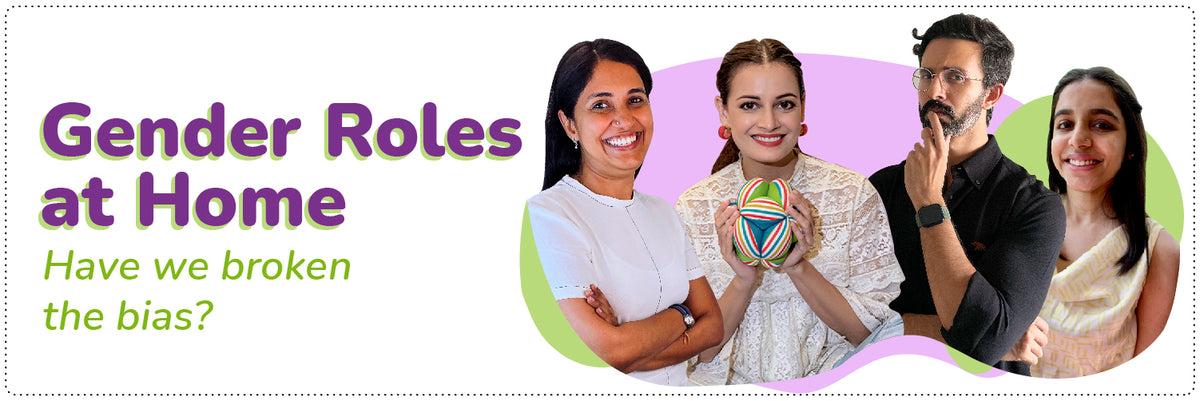Pink for girls and blue for boys, kitchen sets for girls and toy cars for boys, girls shouldn’t be too ambitious and boys too emotional – while most of us have grown up around such biases, chances are that we’re trying to raise our children differently.
But there’s no simple way to raise a child in a world that’s still filled with gender stereotypes. Which is why when we heard that #BreakTheBias was the theme for this year’s International Women’s Day, we knew that we needed to have a conversation about it.
So this week, we sat down with some awesome parents to find out what raising a child in today’s world looks like for them. In conversation with shumee CEO Meeta Sharma Gupta was actor, producer, and environmentalist Dia Mirza, entrepreneur, podcaster, and author Varun Duggirala, and conversationalist and disability ally, Tresa Joseph.
Whie Tresa’s daughter Amelia was born with a rare genetic condition, Dia had her son Avyaan during a pandemic. When Varun and his wife had their daughter Leia, he realized that men are never taught what to do when they become parents! Each of our guests have had a unique set of challenges which gave way to valuable insights. Here are some highlights from this real and honest session.
Unique challenges, unique perspectives
Before Amelia was born, Tresa had everything planned out from sleep training to feeding schedules. But when she was born with an ultra rare medical condition, Tresa had to throw away all her plans. In the years that followed, and especially during the pandemic, she realized that the most important thing was to just stay present with our children and appreciate every moment.
While we all want to raise kids without any biases, Tresa reminded us that sitting down with them and enjoying their company is not only the best place to begin, it will also teach us just as much as we can teach them!
Are you committed to raising a happy child? Don’t forget to teach them these 7 lessons. |
Dia echoed a similar sentiment when recalling how the pandemic impacted her life. When Avyaan was in an Intensive Care Unit for his first few months, she realized that being there and valuing each moment was crucial. Having her husband work from home allowed them to lean on each other, a big part of equal parenting. While her daughter Samaira attended homeschool, Dia also learnt how useful it was to gently handhold without being overbearing.
When fellow fathers ask Varun what they are supposed to do, he says one thing – start by doing the stuff that your wife doesn’t want to. Varun believes that the easiest way for a father to pitch in is by paying attention and showing up for a mother. He notes how it’s essential for children to see their parents move through fluid roles, taking turns stepping into their vulnerable and strict sides.
So how do we break gender biases at home?
As with everything else, children learn the most by observing their parents. All our guests agreed that it is essential to walk the talk if we expect our children to believe what we tell them.
This means sharing responsibilities equally between parents. Give your child a chance to see that dads can cook and be silly and moms can have just as many work responsibilities.
Perhaps, you could go further and try to bring in a more gender-neutral approach to stereotyped assumptions about boys and girls. For instance, Varun makes a conscious effort to wear more pink and lets his daughter paint his nails on occasion! Such small actions can go a long way in ungendering the world for our kids.
At shumee, we focus on creating gender-neutral toys for open-ended play. Here, a child decides how they wish to play with a toy. We love that boys use our kitchen sets and girls play with our cars. We even have a gender-neutral set of peg dolls for kids to enjoy!
Looking to get gender biases out of the playroom? Give this podcast a listen. |
All that being said, what if a little girl likes pink, frilly dresses and a boy doesn’t take to dolls? Have a conversation with your child and try to understand how they are thinking. At the end of the day, remember that such preferences are a matter of choice, so allow your child this respect and agency.
Raising empowered children
Even if we work hard to model equality at home, we won’t be the only people in our children’s lives! The people around us will have an impact on us and our little ones. To this end, Varun mentions how having a community of folks with the same beliefs has provided his family the support they’ve needed. There will always be naysayers who question our parenting decisions, all we can do is know our priorities and honour them.
When talking about Amelia, Tresa reminds us that children have their own ways of naturally adapting into this world. Our role is to follow their lead and protect and guide them where it’s needed. Here’s hoping that as our children make their way in this world, they move with compassion, curiosity, and acceptance!
You can watch the entire session here. If you enjoy the chat, drop a comment and let us know.
Connect with our panelists on Instagram @meetasharmagupta, @diamirzaofficial, @varunduggi, and @teezajo.

